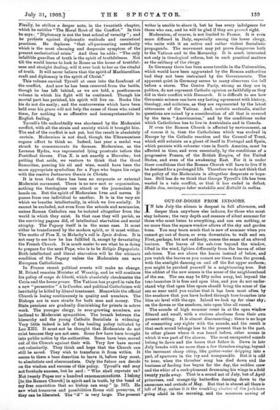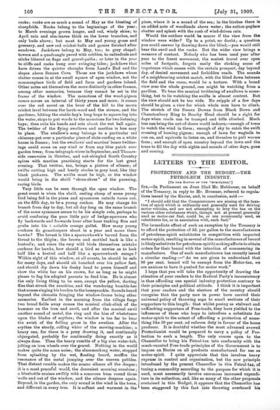OUT-OF-DOORS FROM INDOORS.
IN late July the silence is deepest in full afternoon, and deeper. than anywhere else indoors, for those who muat stay indoors; the very depth and essence of silent summer for those who must listen to everything, and can see nothing, or no more than the square window allows of the sky and garden trees. You may learn much that is new of summer when you cannot go out of doors, or even downstairs. to walk and see. First, perhaps, but not suddenly, comes the sense of an altered horizon. The leaves of the ash-tree beyond the window, lifted in the wind, lighten differently from the leaves of other ash-trees. You are above the. leaves instead pf below, and you watch the leaves as you cannot see them from, the ground, with the sunlight dancing on and off the flat upper surfaces; you might be perched yourself in a neighbouring tree.. But the oddest of the new senses is the sense of the neighbourhood of the sea. The sea may be fifty miles away, but beyond the trea-branches it is free and open blue, and. you do not Wider- stand why. that open blue space should bring the sense of the sea so near until you realise that it has been most often by the seashore that you have looked through tree-branches into blue air level with the eye. Inland we look .up for clear sky; on the downs or the seashore, into open blue all round, , The sounds of high summer come in at the open window filtered and small, with a curious aloofness from their own present setting. It is almost disconcerting; there is no hope of connecting any sights with the, sounds, and the result is that each sound belongs less to the present than to the past, to other places where it .was .11eard before,, other scenes in which it was part of the phorus. The most unexpected sounds belong to dawn and the houra that follow it. Dawn in late July breaks with no more than a few thrushes singing, beyond the incessant sharp chirp, like gutter-water dripping into a pail, of sparrows in the ivy, and honeysuckle. But.it iv .94a to ..bear, when the thrushes' song has died down and the business of feeding has begun for the day, the sudden caper and the whirr of a cock-pheasant drumming, his wings in a field twenty yards away. That is a sound not of July, but of Arpr41 primroses, and orange4ip butterflies dancing down to the anemones and orchids of May. But that is almost.all there ia left of May, unless it is the crackling chatter of .1 be. jackdaws going afield in the morning, and the sonorous cawing of rooks; rooks are as much a sound of May as the bleating of Sheepfolds. Rooks belong to the beginnings of the year ; to March evenings grown longer, and red, windy skies; to April rain and elm-leaves thick on the lower branches, and only buds above ; but most to May and young grass and greenery, and new red cricket-balls and games finished after sundown. Jackdaws belong to May, too; to grey chapel- towers and a quadrangle paved with cobbles, to cathedrals and sticks littered on flags and gravel-paths ; or later in the year to cliffs and rocks hung over swinging tides ; jackdaws that have driven the quieter choughs from Land's End and the slopes above Sennen Cove. Those are the jackdaws whose clatter comes in at the small square of open window, not the commonplace birds of field and farm and gardens inland. Other notes set themselves the more distinctly in other frames, among other memories, because they cannot be set in the frame of the window. The monotone of the wood-pigeon Comes across an interval of thirty years and more; it conies over the red sorrel on the brow of the bill to the mown cricket level between the larch-wood and the stream, and the gardener, bitting the stable-boy's long hops to square-leg into the water, stops to put words to the monotone for two listening boys; then rubs his hands and sets about the wet ball again. The twitter of the flying swallows and martins is less easy to place. The swallow's song belongs to a particular red chimney-pot over a particular piece of slate-roofing on a white house in Sussex ; but the swallows' and martins' lesser twitter- ings could come on any wind or from any blue patch over garden trees; from telegraph-wires in September, and Thames- aide reservoirs in October, and oak-shingled South Country spires with martins practising starts for the last great evening. That twitter, too, brings a picture of silence ; of swifts cutting high and lonely circles in grey heat, like tiny black pickaxes. The swifts must be high, or the window would bring in the shrill " skree-skree" of the pursuing, racing birds.
Very little can be seen through the open window. The great event is when the shrill, reeling cheep of some young bird being fed in the pines and sycamores outside turns out, on the fifth day, to be a young cuckoo. He may change his branch from day to day, but all day long on the same branch of the same sycamore seems to be his simple rule, perhaps to avoid .confusing the poor little pair of hedge-sparrows who fly backwards and forwards hour after hour tucking flies and grubs into his b_satiable orange gullet. How many young cuckoos do gamekeepers shoot in a year and name them hawks ? The breast is like a sparrowhawk's barred from the throat to the thighs ; the brown and mottled back is like a kestrel's; and since the very wild birds themselves mistake cuckoos for hawks, how should a bird so unwise as to look half like a kestrel and half like a sparrowhawk escape ? Within sight of this window, at all events, he should be safe for many days, and should sit hunched over his yellow feet, and should dip down his dusky head to preen himself and show the white bar on his crown, for as long as he might please to fag his adopted parents to feed him. He is almost the only living thing to be seen, except the yellow, darting flies that streak the sunshine, and the wandering bumble-bee that comes singing his burden to the honeysuckle. Sounds heard beyond the clematis fringing the window-frame bring other memories. Earliest in the morning from the village forge two broad fields away comes the musical clink-clink of the hammer on the iron and anvil, and after the musical anvil another sound of metal, the ring and the hiss of whetstones upon the blades of scythes ; the window is too far to hear the swish of the falling grass in the swathes. After the scythes the steady, rolling whirr of the mowing-machine; a heavy one, for there is a pony drawing it, and continually 'objurgated, probably for continually doing exactly as it always does. Then the heavy rumble of a big zinc water-tab, jolting on iron wheels over the gravel. Nothing in the world makes quite the same noise; the slummocking water, stopped from splashing by the wet, floating board, muffles the 'resonance of the metal jumping over the uneven pebbles. That distant rumble makes the nearer silence all the deeper; it is a most peaceful world, the drowsiest morning sunshine ; .ft bluebottle cruises swiftly with a sonorous hum round three 'walls and out of the window, and the silence deepens again. 'Beyond, in the garden, the only sound is the wind in the trees, and different in every tree. It is softest and warmest in the
pines, where it is a sound of the sea; in the birches there is an added note of woodlands above water ; the cotton-poplars chatter and splash with the rush of wind-driven rain..
Would the outdoor world be nearer if the view from the window were wider? Up to a point, no doubt; a question you could answer by drawing down the blind,—you would still hear the anvil and the rooks. But the wider view brings a measure of content. Nobody who has been used year after year to the freest movement, the easiest travel over open miles of footpath, forgets easily the choking sense of impotence which comes with the certain prospect, day beyond day, of denied movement and forbidden roads. The sounds of a neighbouring cricket match, with the blind down between the field and the room, would be a torture. With a broad view over the whole ground, one might be watching from a pavilion. To hear the musical twittering of swallows is some- thing, but to lie watching the swifts is almost content. But the view should not be too wide. No cripple of a few days should be given a view for which whole men have to climb. The stretch of the Sussex Downs from Black Down and Chanctonbury Ring to Beachy Head should be a sight for days when roads can be tramped and hills climbed. Much less can bring the out-of-doors world indoors,----enough of trees to watch the wind in them ; enough of sky to catch the swift crossing of homing pigeon; enough of lawn for wagtails to run on, and squirrels to listen on, and thrushes to pull worms from ; and enough of open country beyond the lawn and the trees to fill the day with sights and sounds of other days, gone and coming.







































 Previous page
Previous page